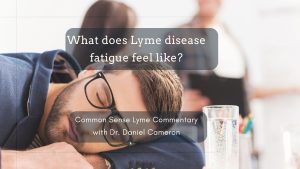Call for your appointment today 914-666-4665 | Mt. Kisco, New York

A recent study by Wells and colleagues ¹ confirms findings from previous studies which demonstrated that POTS patients with brain fog have impaired short-term memory and diminished alertness.
POTS is characterized by a substantial increase in heart rate and sometimes a drop in blood pressure when the individual stands up. This can cause lightheadedness, heart palpitations and in some cases, a loss of consciousness.
The authors measured short-term memory problems and alertness in 11 POTS patients with brain fog using neurocognitive testing and compared them with 8 healthy controls.
[bctt tweet=”Impaired short-term memory and alertness may reflect the symptom of brain fog in POTS patients, according to study findings.” username=”DrDanielCameron”]
They found that “POTS patients demonstrated significantly longer latency in delayed match to sample response time and greater errors in attention switching task.”
While previous studies have shown neurocognitive deficits in POTS patients with evidence of impaired cerebral blood flow, Wells and colleagues report that such deficits can occur in patients with POTS “even in the absence of impaired cerebral blood flow.”
Editor’s note: I have seen individuals with Lyme disease who suffer from “brain fog” and POTS. I would appreciate a study to determine how often brain fog occurs in Lyme disease patients presenting with POTS.
Related Articles:
POTS: An autonomic dysfunction in Lyme disease patients
What exactly is POTS: postural tachycardia syndrome?
Could POTS and Lyme disease patients suffer impaired cognitive function when standing?
References:
- Wells R, Paterson F, Bacchi S, Page A, Baumert M, Lau DH. Brain fog in postural tachycardia syndrome: An objective cerebral blood flow and neurocognitive analysis. J Arrhythm. 2020;36(3):549-552.




My 59-year old daughter has had Lyme Disease for several years and appears to be suffering from psychological problems as a result of her chronic condition. Barbesia seems to be the culprit but since I live in Texas and she is near San Francisco, I do not see her often and can only make assumptions about her strange behavior. It is almost like a manic reaction to everyone in the family. In fact, her quick temper has literally alienated her from everyone. She has become a very angry person and having a normal relationship has become impossible for all her family. Breaks my heart. I suggested she see a therapist but was told her treatment is too expensive for that…what is a mother to do…..
It is a tough situation. I would love to be of assistance but I do not have a license in California.
Dear Dr Cameron;
We are in the Uk.
My son is 14. He has had brain fog symptoms every month or every other month for Around ten days at a time for a year now , since having an infection and high temperatures in June 2019. We are receiving a course of treatment consisting of natural supplements from the BCA but I wonder if we may be considered for ceftriaxone IV as he is suffering anxiety, depression, weight loss and losing too much of his young life. Thank you for your time.
I am sorry to hear your son is not well. I typically favor including an antibiotic in my treatment approach if I suspect Lyme disease. I typically start with oral even if there are neurologic and neuropsychiatric symptoms.
My 15 year old son started his decline in January 2019. He cycled between extreme mania and depression characterized by EXTREME brain fog. These cycles would last about 12 days each. There was no normal behavior in between. The school called me several times because he was so “foggy” they thought he would be a safety hazard. He couldn’t remember how to open a lunch pail. He had to be prompted on picking up a pencil. When he spoke, it sounded like he had a stroke. He could not find his words. He still became worse over time. His initial Lyme test was negative. His second was positive. We started him on several herbal meds and oral antibiotics. He still declined. During one manic session in November he had a very serious psychiatric break. Lost all touch with reality and ended up in a psychiatric hospital for two weeks. The day he came home we started IV rocephin 7 days a week. The antibiotics continued for 5 months. It is now August and he is finally being weaned off his oral antibiotics. His behavior has completely changed since the IV antibiotics. He is back to himself. There are so many things to this story I am leaving out. Some of the events that we experienced During his mania were just unbelievable. We thought our life, and his life was over. We have been seeing a wonderful specialist in Lyme disease. Our son would be a very interesting case study. We are waiting to see how his symptoms are when he is finally off ALL his meds. There is hope!
I am so happy that you found an answer for your son.
Please Put the boy on IV antibiotics. They saved my sons life. He was going through some serious psychological effects from Lyme disease.